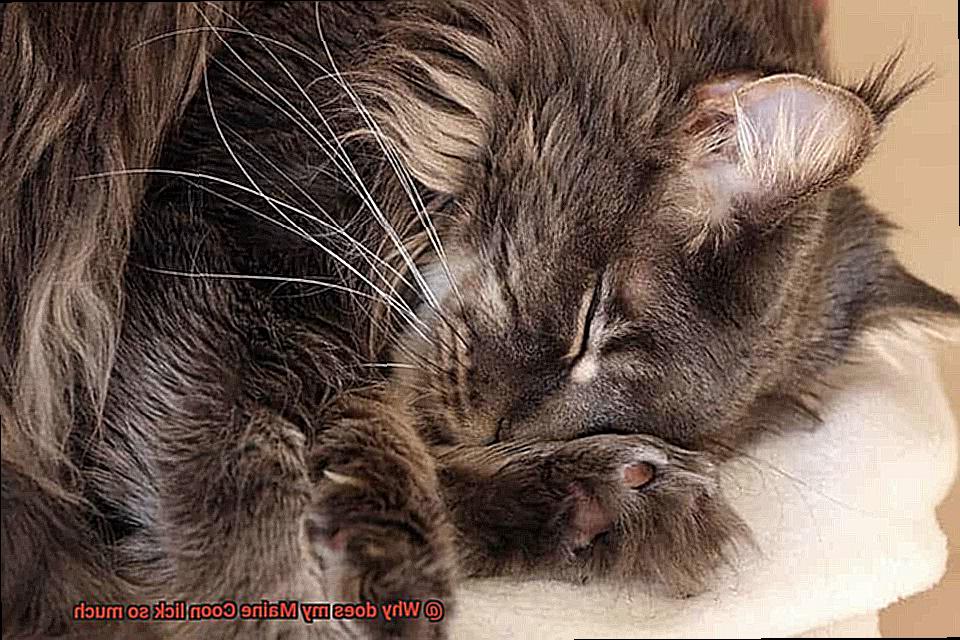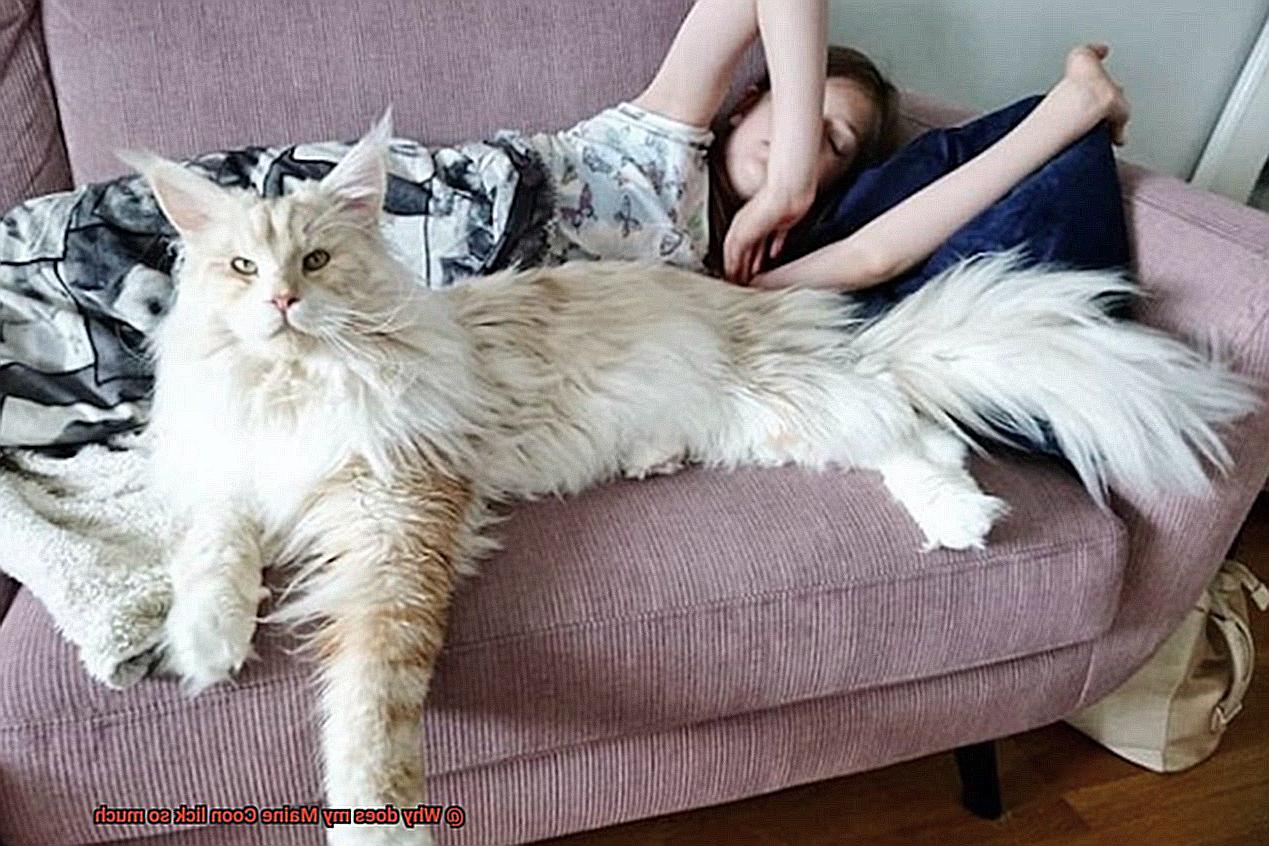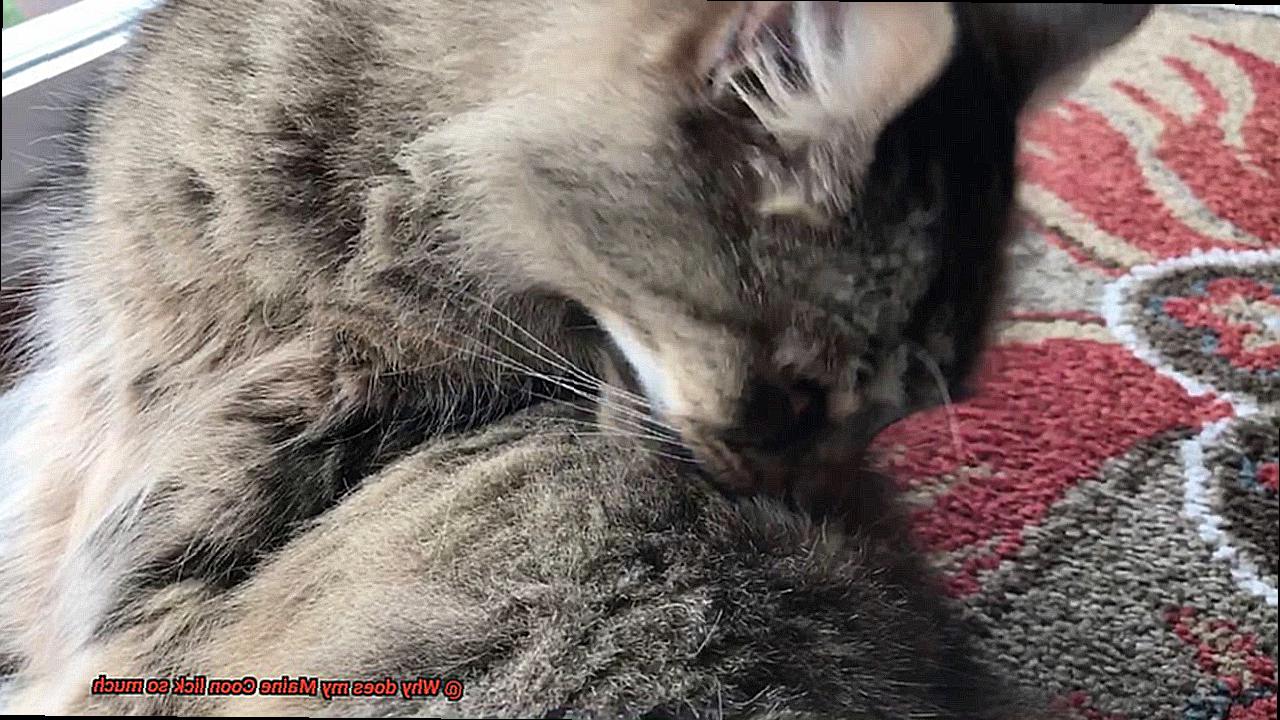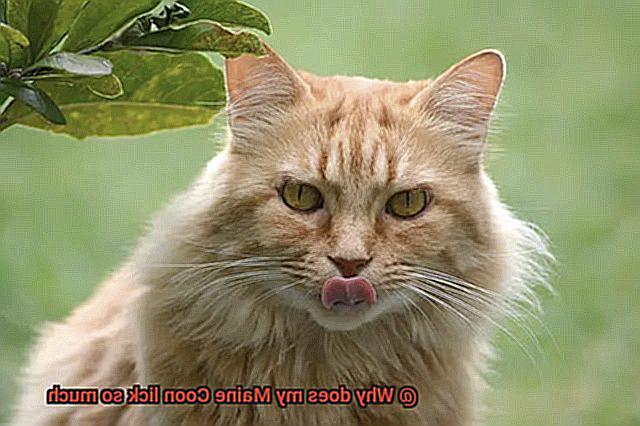As a Maine Coon owner, you might have noticed that your furry feline friend is an avid licker. Whether it’s themselves, you or even your furniture, their licking habit can be endearing at first. However, excessive licking could indicate deeper health issues that require attention.
So what’s behind all the licking? Let’s explore the reasons why. Firstly, cats are known for their cleanliness and grooming habits. Licking helps them remove dirt and debris from their fur that they may have missed during self-grooming.

Another reason for excessive licking could be due to stress or anxiety. Cats thrive on routine and any disruption to their environment can cause them to become anxious or upset. Licking can be a way of self-soothing and providing comfort during stressful times.
Lastly, obsessive licking could indicate underlying medical conditions such as allergies or skin irritations. As a responsible pet owner, it’s important to monitor your Maine Coon’s grooming habits and seek veterinary advice if you notice any unusual behavior.
So next time you catch your Maine Coon in the act of licking, remember that it may not just be a sign of affection but also an instinctual need for cleanliness or a coping mechanism for stress. Keep an eye on their grooming habits and seek professional help if necessary to ensure they remain healthy and happy companions.
Reasons Why Maine Coons Lick Excessively
Fortunately, there are several reasons why Maine Coons lick excessively, and identifying the underlying cause is key to finding a solution.
Firstly, stress and anxiety can cause excessive licking in Maine Coons. Cats often resort to grooming when they feel anxious or stressed, and this behavior can become compulsive over time. If you notice your Maine Coon licking excessively in response to a particular situation or event, such as loud noises or changes in routine, it could be a sign of stress. Spending more quality time with your cat and providing interactive toys can help reduce their stress levels.
Secondly, skin irritation or allergies can also lead to excessive licking behavior. Fleas, mites, and other parasites can cause skin irritation and make your cat itch, leading to excessive grooming. Allergies to food, pollen, or even household cleaners can also trigger excessive grooming. A visit to the veterinarian can help identify the root cause of the irritation and provide medication or recommend changes in diet or environment.
Thirdly, boredom is another reason why Maine Coons may lick excessively. These curious creatures need mental and physical stimulation to stay engaged. If your Maine Coon is left alone for long periods without any toys or activities to keep them occupied, they may resort to excessive licking as a means of self-soothing. Providing interactive toys and spending more time playing with your cat can help alleviate boredom.
Fourthly, dental problems such as tooth decay or gum disease can cause pain and discomfort in your cat’s mouth, leading to excessive licking behavior. Regular dental check-ups with your veterinarian can help diagnose any underlying dental issues and provide appropriate treatment.

Finally, some medical conditions such as hyperthyroidism or digestive issues can cause Maine Coons to lick excessively. These conditions can cause discomfort or pain, leading to excessive grooming behavior. A thorough examination by a veterinarian can help diagnose these medical conditions early, which can help in better managing the condition.
In conclusion, excessive licking behavior in Maine Coon cats can be caused by various reasons. By understanding the underlying cause, pet owners can take steps to address the behavior and ensure their cat’s health and happiness. If you notice your Maine Coon licking excessively, it’s recommended to seek advice from a veterinarian who can help identify any underlying medical conditions and provide advice on how to manage your cat’s behavior.
a. Stress or Anxiety

Excessive licking is a common behavior that may indicate your cat is feeling overwhelmed. But what causes stress and anxiety in Maine Coons, and what can you do to help them feel better?

Maine Coons may experience stress when there are changes to their environment, such as moving to a new home or meeting new people or pets. They may also become anxious during visits to the vet or when exposed to loud noises. Excessive licking can be a sign of generalized anxiety disorder or separation anxiety.
If you suspect your Maine Coon is feeling stressed or anxious, it’s important to address the underlying issue. Providing your cat with a safe and comfortable environment is key, and minimizing any changes that could cause stress is crucial. Consider using calming pheromones or consulting with a veterinarian about prescription medication options to manage their anxiety.
In addition to these measures, spending quality time with your cat can help alleviate stress and anxiety. Playing with them regularly and providing plenty of toys and activities can keep them engaged and happy. And don’t forget the importance of regular check-ups with your veterinarian to ensure your cat’s overall health and well-being.
b. Skin Irritation or Allergies
Their affectionate and laid-back personalities are complemented by their fastidious grooming habits. However, if you notice your Maine Coon excessively licking a particular area of their body, it could be a sign of skin irritation or allergies.
Skin irritation in Maine Coons can stem from various factors, such as fleas, ticks, mites, or fungal infections. These irritations can cause itching and discomfort, leading to excessive licking. On the other hand, Maine Coons can also develop allergies to certain foods or environmental factors such as pollen or dust. Allergic reactions can cause itching and irritation, leading to excessive grooming and licking.

So how can you prevent skin irritation and allergies from affecting your beloved Maine Coon? Here are some tips:
Firstly, ensure that your Maine Coon is on a healthy and balanced diet that meets their nutritional needs. A well-nourished cat will have a stronger immune system and be less prone to skin problems.
Secondly, maintain good hygiene practices by regularly grooming your cat and cleaning their living space. This includes keeping their litter box clean and washing their bedding often.
Lastly, regular check-ups with the vet can help identify any potential health concerns before they become a problem. Your vet may recommend allergy testing or prescribe medication to alleviate any discomfort.
If you notice your Maine Coon excessively licking a particular area of their body, it is crucial to take them to the vet for an examination. Your vet can help identify the source of the problem and provide necessary treatment.
c. Medical Conditions
Maine Coons are generally known for their robust health, but like all pets, they can be susceptible to medical conditions that may cause excessive licking. As an expert in feline health, I have identified some common health issues that may lead to this behavior in Maine Coons.
Firstly, allergies can be a culprit behind excessive licking. Maine Coons can develop allergies to certain foods, environmental factors like pollen or dust, and even flea bites. If your cat is persistently licking and scratching, it could be a sign of an allergy. It’s essential to consult your veterinarian for appropriate diagnosis and treatment.
Secondly, dental problems such as gingivitis or periodontal disease can lead to pain and discomfort in the mouth, resulting in excessive licking. Regular dental checkups and cleanings can help prevent these issues.
Thirdly, hyperthyroidism is a condition where the thyroid gland produces too much thyroid hormone, leading to increased activity levels. Excessive grooming is a common symptom of hyperthyroidism in Maine Coons.
Lastly, anxiety or stress can trigger excessive licking in Maine Coons. Cats can get stressed by any changes in their environment or routine, which may lead to anxiety or boredom. Excessive licking can be a coping mechanism for cats experiencing such emotions.
It’s crucial to consult your veterinarian if you observe any changes in your Maine Coon’s behavior, including excessive licking. They can diagnose and treat any underlying medical conditions that may be causing the behavior.
Signs of Excessive Licking in Maine Coons
Maine Coons are adored for their grooming habits, but excessive licking can be cause for concern. As an expert in feline health, it’s essential to understand the signs of excessive licking in Maine Coons.
One telltale sign is hair loss or bald spots. Constant licking can cause fur to become matted and eventually fall out. If you notice areas of thinning or missing fur, it’s crucial to investigate why your Maine Coon is excessively licking.
Another indicator is the appearance of rashes or sores on the skin. Licking can lead to irritation and inflammation, resulting in redness or even open wounds. These sores can be painful for your cat and necessitate veterinary attention.
Behavioral changes can also be a warning sign. If your Maine Coon is constantly grooming themselves and seems agitated or anxious when they’re not able to lick, it could indicate an underlying issue. Additionally, if they’ve stopped engaging in activities they once enjoyed or seem more lethargic than usual, it might be time to investigate whether their excessive licking is related.
It’s important to note that while grooming habits are natural for cats, excessive licking can signal a larger issue. If you notice any of these signs in your Maine Coon, it’s critical to consult with a veterinarian to determine the underlying cause and provide appropriate treatment.
Solutions for Managing Excessive Licking in Maine Coons
While cats are known for their fastidious grooming habits, excessive licking can lead to hair loss, skin irritation, and painful sores. As an expert in feline health, I have compiled some solutions to help manage this behavior in your Maine Coon and ensure they live their best life yet.
The first step in managing excessive licking in Maine Coons is to identify the root cause. If your cat is licking due to anxiety or boredom, providing them with mental stimulation and plenty of toys can help redirect their behavior. Engaging interactive toys such as puzzle feeders or laser pointers can provide entertainment and exercise for your cat. Additionally, dedicating time each day for play and physical activity can help reduce anxiety and boredom-induced licking.
If you suspect that your Maine Coon’s excessive licking may be due to an underlying medical condition, it’s important to consult with your veterinarian. Medical conditions such as allergies or skin irritations can cause excessive grooming and licking behavior. Your veterinarian may recommend medication, topical treatments, or changes in diet to address these issues.
In some cases, behavioral modification techniques such as training and positive reinforcement can also help manage excessive licking in Maine Coons. Working with a professional animal behaviorist can provide you with the tools and techniques necessary to help modify your cat’s behavior and reduce excessive licking. It’s important to remember that every cat is unique, and what works for one may not work for another.
Managing excessive licking in Maine Coons requires patience and consistency. It may take time to see a change in your cat’s behavior, but with the right approach, it is possible to reduce their excessive licking and improve their overall well-being. Remember to praise and reward good behavior, as positive reinforcement goes a long way in modifying your cat’s behavior.
qdowIJu8mUw” >
When to Visit the Veterinarian for Excessive Licking in Maine Coons

One concerning behavior to be on the lookout for is excessive licking, which can indicate an underlying health issue.
If your Maine Coon is licking excessively and exhibiting signs of pain or discomfort, such as crying out when touched or avoiding certain areas of their body, it’s time to schedule a visit with your veterinarian. These symptoms could be a sign of a more serious underlying health issue that requires immediate attention.
Changes in behavior can also signal the need for a veterinary visit. If your usually lively and active cat suddenly seems more lethargic than usual, avoids food or water, or shows signs of depression or anxiety, it could be an indication of a more serious health issue.
Don’t delay if you’re unsure whether your Maine Coon’s excessive licking is cause for concern. Contact your veterinarian and schedule an appointment for an evaluation. Early detection and treatment of any underlying health issues can help ensure the best possible outcome for your furry friend.
Some common health issues that can cause excessive licking in Maine Coons include allergies, skin infections, dental problems, and gastrointestinal issues. Without proper care, these conditions can worsen and lead to further health complications for your beloved pet.
Also Read: Why Does My Cat Lick Me Then Bite Me?
Conclusion
In conclusion, if you’re wondering why your Maine Coon licks so much, there are various reasons for this behavior. Identifying the root cause is essential to finding a solution and ensuring your cat’s health and happiness.
Your feline friend may be licking excessively due to stress or anxiety, skin irritation or allergies, dental problems, boredom, or medical conditions such as hyperthyroidism or digestive issues. As a responsible pet owner, it’s crucial to monitor your cat’s grooming habits and seek veterinary advice if you notice any unusual behavior.
Fortunately, there are solutions for managing excessive licking in Maine Coons. Providing mental stimulation with interactive toys and dedicating time each day for play and physical activity can help reduce boredom and stress. Additionally, behavioral modification techniques such as training and positive reinforcement can also be effective in managing excessive licking.
It’s important to remember that every cat is unique, and what works for one may not work for another. With patience, consistency, and the right approach tailored to your cat’s individual needs, you can reduce their excessive licking behavior and improve their overall well-being.
If you suspect that your cat’s excessive licking may be due to an underlying medical condition, it’s crucial to consult with a veterinarian. They can provide professional guidance on how best to manage the behavior while addressing any underlying health concerns.







